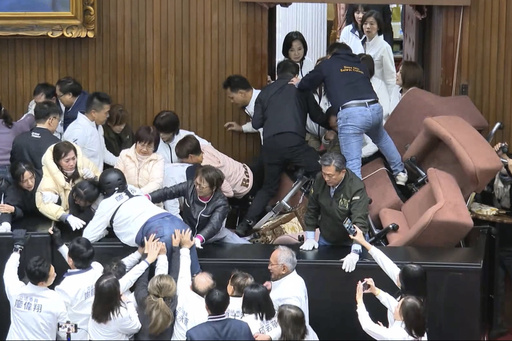
TAIPEI, Taiwan — A significant confrontation erupted on Friday inside Taiwan’s legislature as lawmakers from President Tsai Ing-wen’s party occupied the speaker’s chair, following an overnight infiltration of the building. Members of the Nationalist Party, also known as the Kuomintang (KMT), attempted to enter and remove them, resulting in a scuffle that left some lawmakers injured, although the severity of those injuries remains uncertain.
The center of contention revolves around three controversial bills that the KMT is trying to approve. Critics argue one of these proposals could severely disrupt the operations of the Constitutional Court. Legislators managed to pass two of the measures; the first stipulates that a minimum of ten justices must be present for any court ruling, despite the court currently only having eight justices and seven vacant positions. The second bill aims to tighten the criteria needed for voters to initiate petitions to recall elected officials.
Debate continued late into the night regarding a third bill that proposes reallocating tax revenues to give local governments a greater share. The Democratic Progressive Party (DPP), which has expressed that these bills could undermine Taiwan’s democratic system, reportedly forced entry into the legislative building by removing windows on Thursday night. They barricaded the speaker’s area with stacks of chairs to prevent access.
Footage from Friday morning captured tumultuous scenes where KMT lawmakers endeavored to push through the chair barriers or scale a ledge leading to the speaker’s area. In response, DPP members pushed back against the KMT lawmakers, some even resorting to squirting water at their opponents from plastic bottles.
Ultimately, KMT members, identifiable by their matching white jackets, were able to regain control of the area, enabling the speaker, Han Kuo-yu, to assume his chair. The DPP is vehemently opposing any votes on the contentious bills, with neither major party having secured a majority in the previous legislative election. The KMT, by gaining slightly more seats, has partnered with a smaller party to seize control of the legislature and is now in contention with Tsai’s administration.
A DPP official stated in a social media clip that while their actions might have seemed extreme, they felt they had no choice due to unsuccessful negotiations on the bills. Concurrently, thousands of DPP supporters staged protests outside the legislative building on both Thursday evening and Friday.
Among the protesters, one postgraduate student named Stevie Kuo expressed deep concern regarding the motives of the KMT and its allies, claiming that their objectives involved incapacitating the court, depleting central government resources, and complicating the process for recalling elected officials. “These three developments would pose a significant threat to Taiwan,” Kuo asserted. “The public is clearly against this direction.”
Historically, confrontations in Taiwanese legislature are not unprecedented. For instance, in 2020, lawmakers resorted to throwing pig entrails at each other over a government decision to ease a ban on U.S. pork and beef imports.
